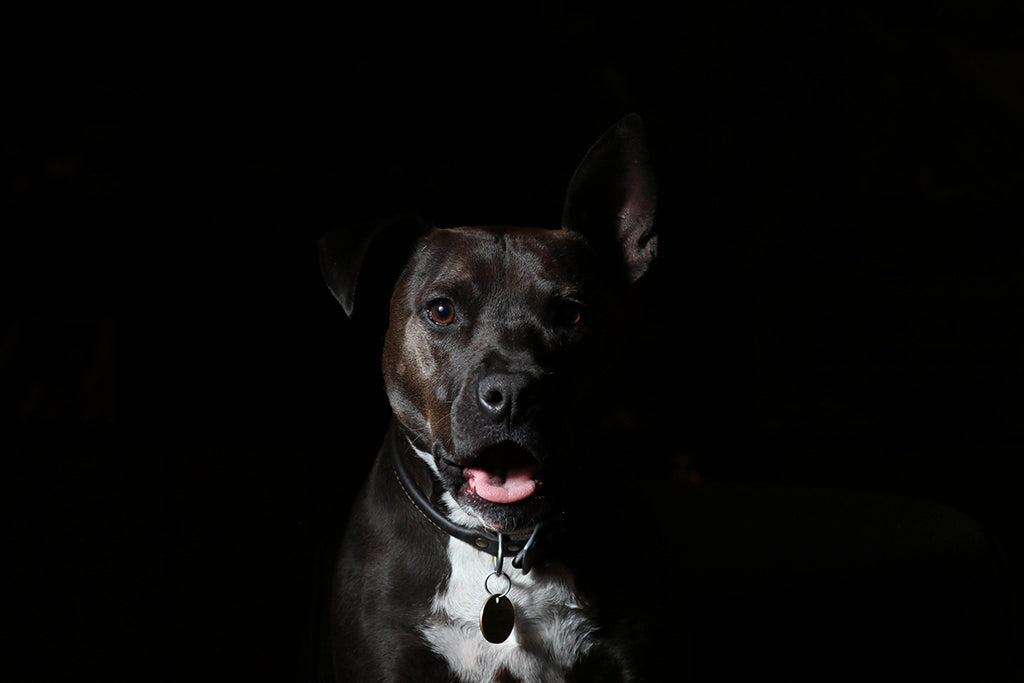Can dogs see in the dark? In this blog, we learn whether dogs can see in the dark and whether dogs can be scared of the dark. We’ll find out how dogs see in the dark and what they can see too.
Can Dogs See In The Dark?

Our eyes, like a dog’s, are continuously active organs. They are constantly adjusting the light they receive to focus and give clarity to the objects and scenes around us. The eye transmits the images it sees directly to the brain which then rapidly processes the information it gathers from them. Sight is an impressive process!
But, when it comes to our canines, how well can they see in the dark? Is it better or worse than our ability to…?
Can Dogs See In The Dark?
Yes, to an extent. Dogs can see in the dark far better than humans (estimated about 5 times better), but not as well as cats. They can’t see in pitch black, but they can see in lower, dim light.
When dogs were wild, they were primarily active at dusk and dawn (making them crepuscular creatures) which is when the natural light is at its lowest. Because of this, they needed to be able to track the movement of their prey in this light in order to survive. So, their ability to see in the dark is actually quite advanced.
As they’ve evolved into domestic animals, their ability to see in the dark has been retained but they’ve adapted more to seeing in a brighter light now too.

How Do Dogs See In The Dark?
A dog’s eye is made up of a pupil, cornea, retina, and lens. The retina part of the eye contains “rods” which absorb light and “cones” to process brightness and colors. Dogs have more light-sensitive rods in their retina than humans do, and because of this they can collect and process slightly more visual information even when there’s not a lot of brightness! And, because they have very large pupils there’s more space to let more light in.
The number of rods present in their retina means they can also detect motion much faster than we can too. A dog can process up to 80 images per second, whereas humans can do around 60 per second.
The light their eyes receive is then processed by a thin piece of tissue behind the retina called tapetum lucidum – humans don’t have this. This reflects and amplifies the light back to the lens (their lens is placed closer to the retina than in a human’s eye) providing a brighter focus on the object/scene in front of them in low light. This is why a dog’s eyes glow green in the dark when light shines on them – it’s reflecting off the tapetum lucidum!
However, despite dogs having a more advanced retina, they have fewer cones in their eyes (which provide clarity) meaning they have a diminished color palette when compared to human eyes and don’t see things in as much detail as we do. They have poorer depth perception and only recognize objects at much closer distances.

Are Dogs Afraid Of The Dark?
Dogs can be afraid of the dark, but it’s difficult to determine. If your dog howls at night when you go off to bed, this is often attributed to separation anxiety – the trigger for the whining and anxious behavior is being away from you.
If a dog’s eyesight is poor, the dark can leave them feeling more isolated and stressed so if you suspect your dog’s sight is diminishing it may be worth getting their eyes tested at the vet. If their eyesight is thought to be fine, and they don’t display signs of occasional anxiety in the daytime then it’s likely your pet is afraid of the dark.
When walking into a dark place, if they try to turn around, sit down and/or refuse to move then this is an indicator of fear or perceived danger. If they tuck their tail between their legs, pant, pace, and sniff a lot in the dark, this is also a good indication that they’re scared of it. They may also scratch at the door or destroy things they know they’re not meant to because of the stress they experience being in the dark.
It’s important not to punish them when they do this – they won’t understand the reasons why and will just become scared of you. Provide them with a small night light and reward them when they don’t exhibit that behavior in the dark to reinforce their confidence with it. If the behavior doesn’t stop after an eye test, providing a night light and reward-based training (involving tasty treats!), have a chat with your vet.
Sources
Author Meyers, Harriet “Can Dogs See In The Dark?” American Kennel Club, Sep 09. 2021 https://www.akc.org/expert-advice/lifestyle/can-dogs-see-in-the-dark/
“Can Dogs See In The Dark?” Pet Finder https://www.petfinder.com/dogs/dog-care/can-dogs-see-in-the-dark/
Author DeAngelis, Simone “Can Dogs Be Scared Of The Dark?” Wag Walking, Feb 07. 2018 https://wagwalking.com/sense/can-dogs-be-scared-of-the-dark
 S
S



